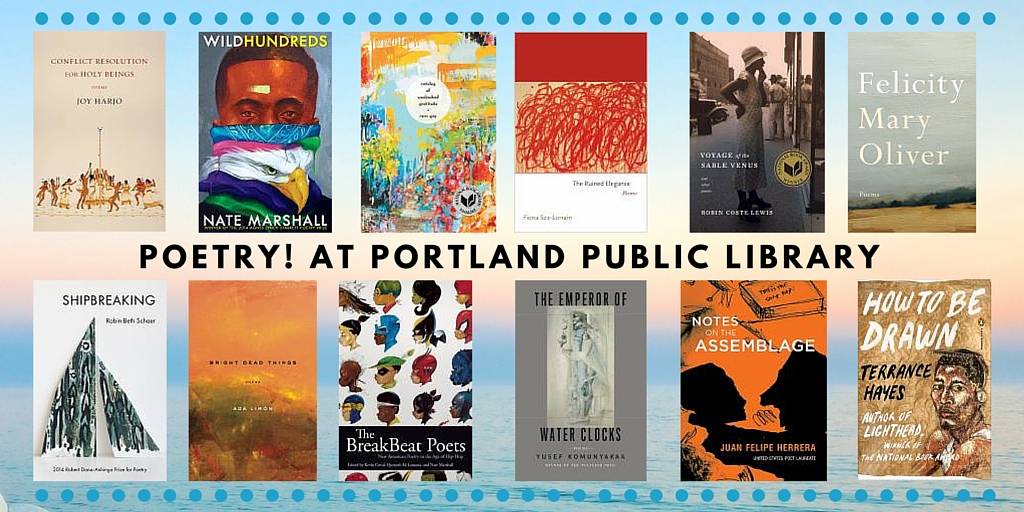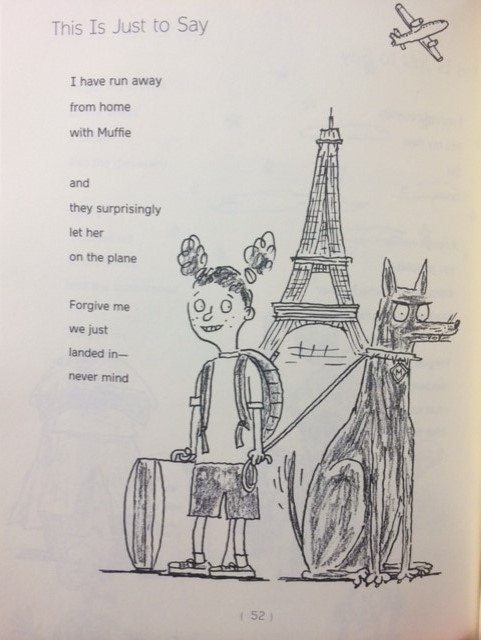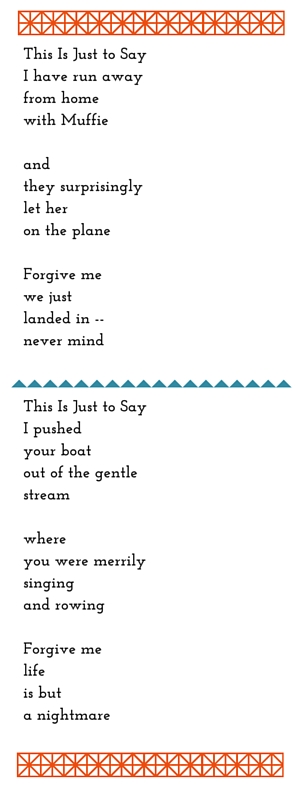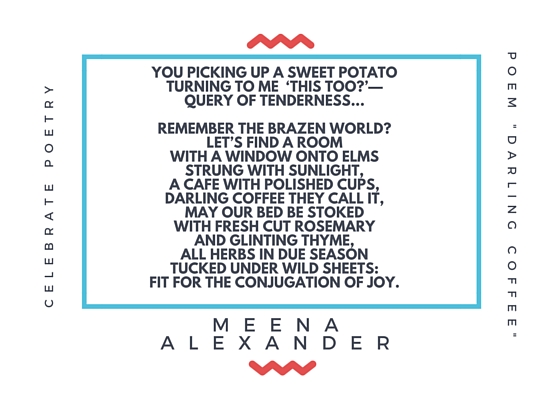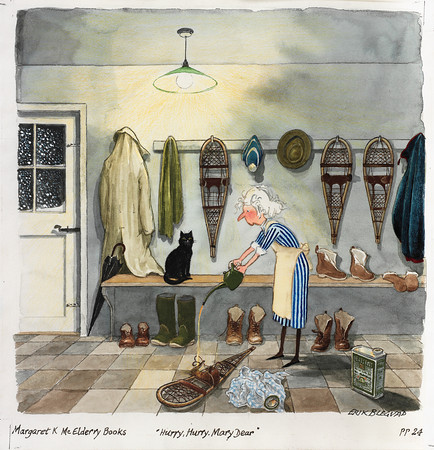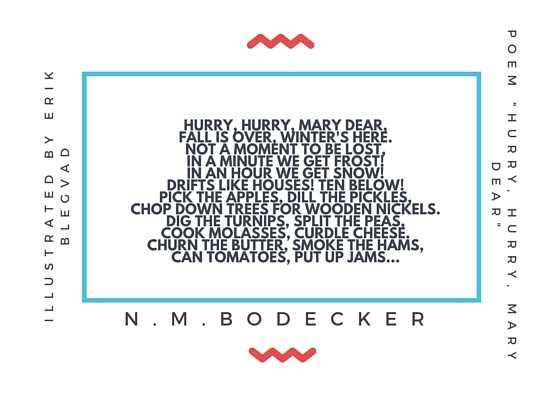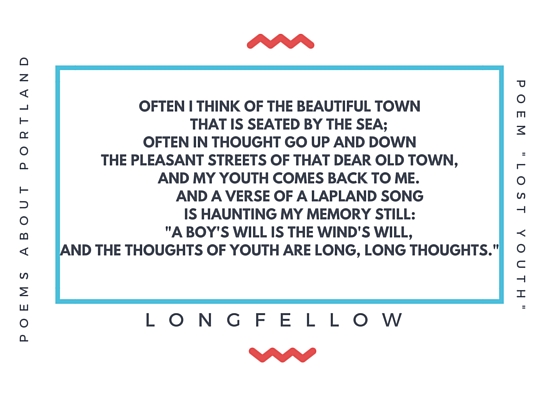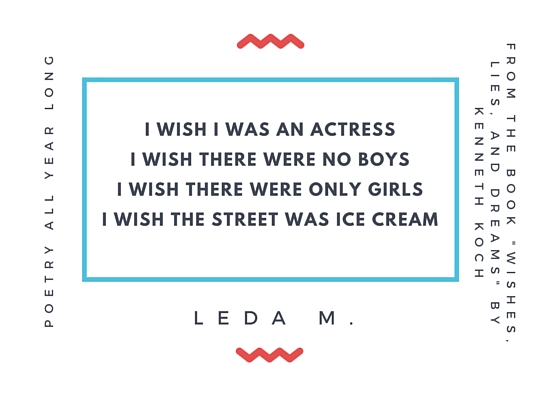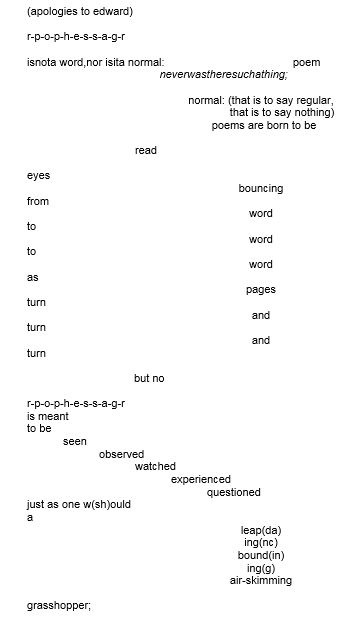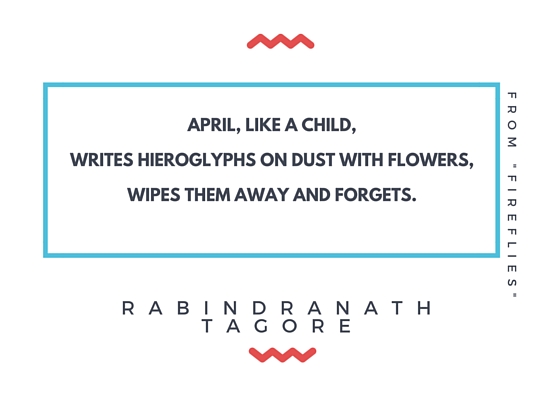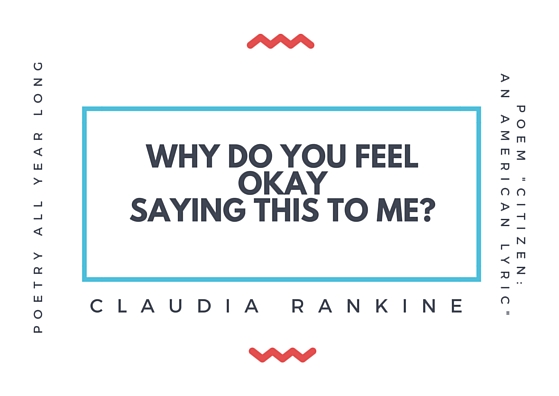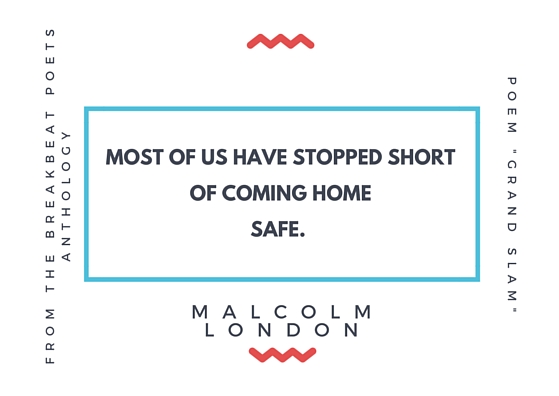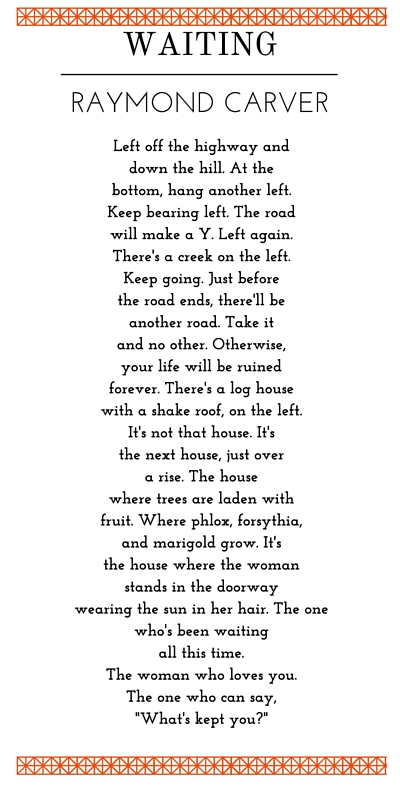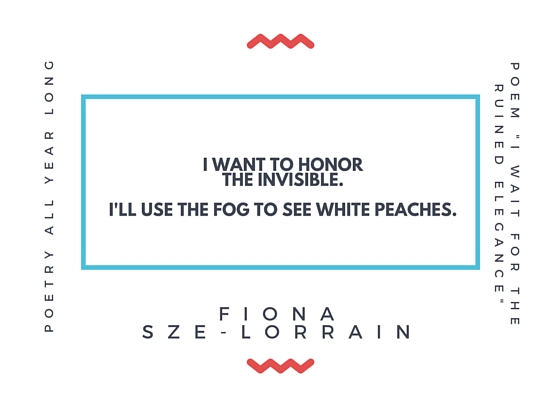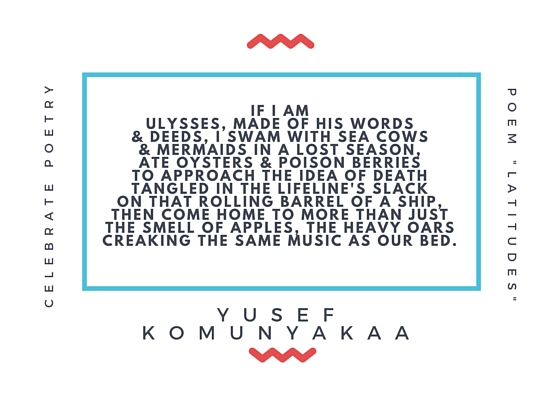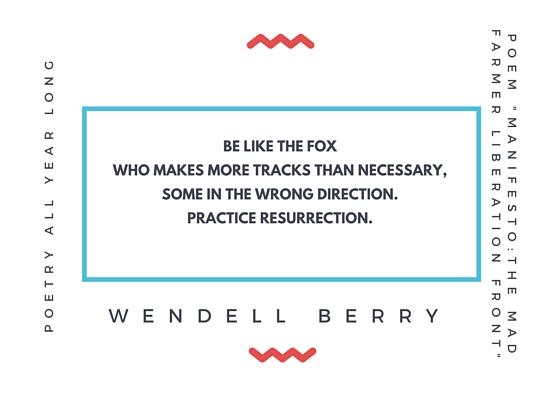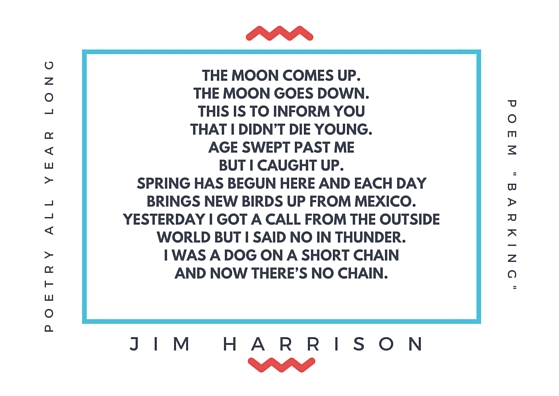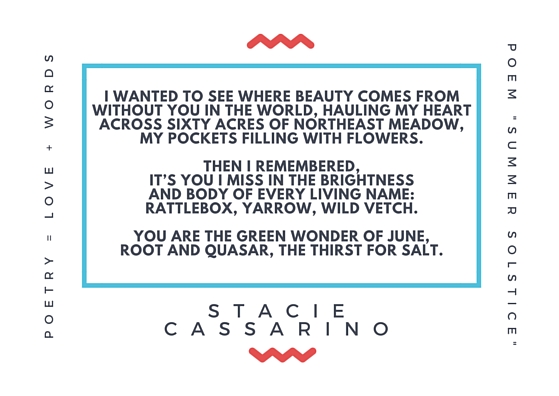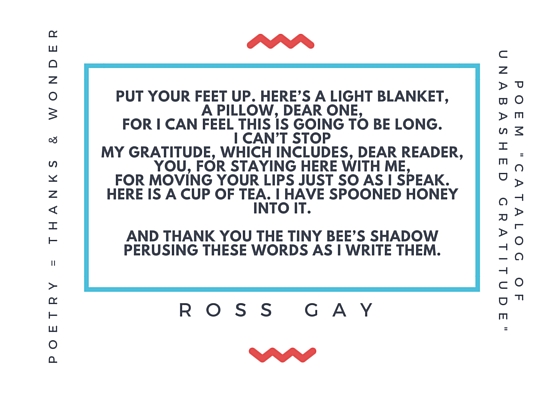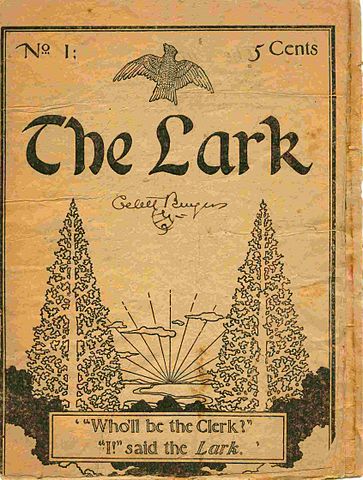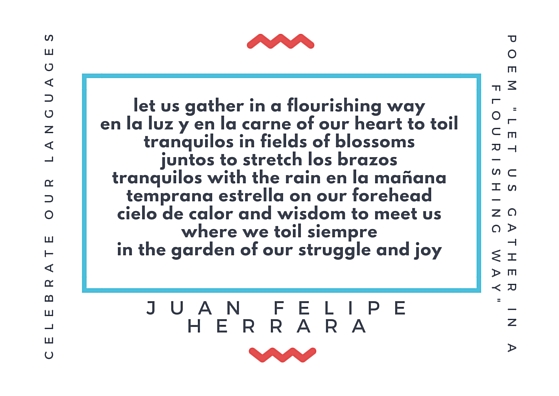The Words Are Maps: Poetry Staff Picks
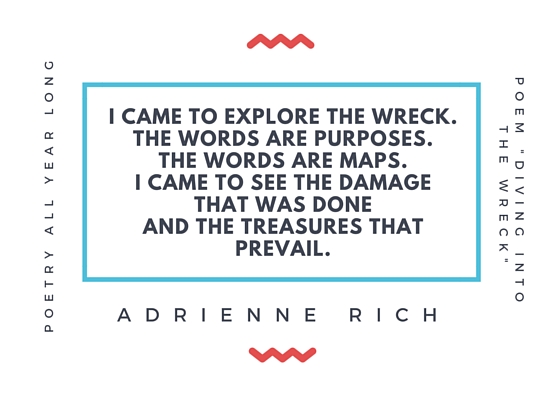
As April comes to a close, our staff reflects on poets and poetry we love–and celebrate–all year long.
Laura’s Pick
I knew from the moment this hilarious little collection landed in my lap (recommended by a friendly fellow Children’s staffer from a neighboring town) that it must be my selection this month: Forgive Me, I Meant to Do It: False Apology Poems by Gail Carson Levine and illustrated by Matthew Cordell. Treat yourself to the delightful backstory of this style of poetry (detailed on pages 22 and 23), devised by the doctor and poet William Carlos Williams and involving stolen plums. It’s hard to pick one favorite from the bunch, so here are two. Notice the wonderfully similar structure of each:
(I will not be reciting that last one at my next story time.)
So next time you have to apologize for something that may or may not have been your fault…take a deep breath and compose a poem.
Gail’s Pick
Hurry, Hurry, Mary Dear, by N.M. Bodecker
If you find an entire collection of poetry a bit weighty, try PPL’s lighthearted picture book, “Hurry, Hurry, Mary Dear”. The book consists of a single poem written by N M Bodecker. Illustrations by Erik Blegvad perfectly capture the sly, witty tone of the poem, as Mary rushes about trying to finish all the chores the narrator thinks she should do before winter sets in. A great read-aloud for kids.
Lisa’s Pick
My pick is a classic: “My Lost Youth” by Henry Wadsworth Longfellow. It’s such a beautiful description of Portland, and so many places named in the poem are still here.
Hazel’s Pick
Wishes, Lies, and Dreams: Teaching Children to Write Poetry, by Kenneth Koch
Wishes, Lies, and Dreams is an absolute goldmine of kids’ writing that boasts some of the funniest and wisest snippets of poetry I’ve ever read. Some are totally goofy and meandering, some are sharp and sincere, and many combine elements of both. A personal favorite:
Sonya’s Pick
“Wilderness” by Jim Morrison
This poem really spoke to me when I was in my early twenties.
What do you want?
Is it music?
We can play music.
But you want more.
You want something & someone new.
Am I right?
Of course I am.
Yes…I wanted more. I wanted it all. But I really had no idea what that was. These verses seemed so romantic and adventurous to me.
Let’s recreate the world.
The palace of conception is burning.
Thaddeus’ Pick (in verse!)
“r-p-o-p-h-e-s-s-a-g-r,” by e.e. cummings
Raminta’s Pick
Fireflies, by Rabindranath Tagore
I grew up in a very literary household full of thousands of books. Over the years, bits and pieces of these books flit in and out of my thoughts. My mother must have had a copy of Rabindranath Tagore’s Fireflies, as one poem has remained with me to this day:
If you enjoy Eastern poetry such as Rumi, I would highly recommend spending an afternoon with Tagore.
Elizabeth’s Picks
The BreakBeat Poets Anthology, Citizen: An American Lyric, Bastards of the Reagan Era, The Wild Hundreds, Voyage of the Sable Venus, Notes on the Assemblage, Catalog of Unabashed Gratitude, Conflict Resolution for Holy Beings. Many of the powerful new poems I’ve seen at the library in the last year are in collections that offer voice after voice of poets reflecting on themes of racism, incarceration, loss, social justice and injustice, history, society, and the individual. And more.
A selection of poetry in 2016: The Wild Hundreds: Poetry.
Patti’s Pick
“Waiting,” by Raymond Carver
One of my favorite poems is Raymond Carver’s Waiting, from his collection All of Us. I first heard it at a friend’s wedding, and it seemed to perfectly describe the twists and turns that lead us to where we’re supposed to be.
Samantha’s Picks
My first pick is Drummer Hodge by Thomas Hardy. One of the reasons I like this poem so much is that pays homage to the unknown soldier, and couples the unknowingness of death with eternal aspects of life and the world. Hardy’s work was also a major influence on Dylan Thomas.
Wendell Berry’s Manifesto: The Mad Farmer Liberation Front is one of those poems I read when I’m aghast with the world. It seems to offer a guide to living, inspiring, actionable words that help the reader to remember what is really important in life. Listening more than speaking, being happy just noticing the movements of the earth, not needing dollars and fancy vacations to be at peace.
Finally, “Shake the Dust” by Anis Mojgani is another inspiring poem for me. I strongly encourage it to be experienced aurally, like this performance here. Mojgani is so expressive, and his words instill confidence, hope, and faith that every human experience has value, purpose, and importance. It gives me the same kind of foot-tapping excitement that a piece of upbeat music brings, and the phrase “shake the dust” is one I have come to hold as a special mantra for being fearless when I feel the most timid.
Kelley’s Pick
Completely unrelated to anything Teen, my choice for a favorite poet would be Jim Harrison, who died last month. Many people know him for his novels (e.g. Legends of the Fall), but I love his collections of poetry; they’re beautiful, rough and honest. Harrison also collaborated throughout his life with the wonderful artist Russell Chatham, whose paintings adorn the covers of Harrison’s books.
Eileen’s Pick
Good poetry is a subjective label. Sometimes it isn’t the poem itself that touches us, but the associations it has.
My mother passed away in April, five years ago. Standing by her grave in the mid-May blossom-filled Mount Auburn cemetery where John Ciardi, James Russell Lowell and Henry Wadsworth Longfellow are spending eternity, my sisters and I shared recollections of our kind mother, Marjorie.
The older of my two sisters told the story of her second grade school assignment: select, memorize and recite a poem, a process that had bogged down at “select,” driving her seven-year-old self to the end of her tightly-wound perfectionist rope as the deadline approached. In her trademark over-achieving fashion, she aimed way beyond necessity and expectations, fretting and sweating over pieces that were too long, too hard, too everything… until our mother, who always seemed to know how to make things better, offered an idea. A poem that was not too long. Not too serious. Just the thing.
55 years later, in the cool of a spring morning, my sister recited that poem again:
The Purple Cow
(Reflections on a Mythic Beast Who’s Quite Remarkable, at Least.)
By Gelett Burgess
I NEVER saw a Purple Cow;
I never hope to See One;
But I can Tell you, Anyhow,
I’d rather See than Be One.
— The Lark number 1, May 1, 1895
That is how it came to be that three middle-aged sisters felt the power of poetry; four lines of silliness in the midst of grief.
Not too long. Not too serious. Just the thing, like all good poetry.
As always, thanks for reading.
posted: , by Elizabeth
tags: Library Collections | Recommended Reads | Adults | Teens | Kids & Families | Seniors | Art & Culture

